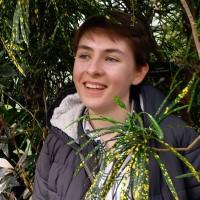Verity
Verity is on a joint degree studying Archaeology and Social Anthropology. She writes and edits for student publications and volunteers for a conservation society and a community gardening group.

What attracted you to the University of Edinburgh and this programme, in particular?
I thought that Edinburgh would be a great city to study in, with plenty going on but also small enough to get to know well in four years. I enjoy the structure of my degree programme and the flexibility to take a variety of courses.
What do you wish you'd worried about less about coming to university?
Academics – the first year is very geared towards teaching students how to read, write, research and do well in a university setting.
What one thing would you recommend new students at the University of Edinburgh do?
I think all students, whether new or not, should find ways to explore and get to know the city of Edinburgh, rather than living solely in the ‘university bubble’. Whether that happens through taking a random bus ride somewhere or joining a volunteering group, it’s rewarding to discover what the city has to offer and where it needs you to contribute.
Any student wisdom you'd like to pass on?
Possibly not a popular opinion, but it does pay to work consistently in your first and second years. Even if those years don’t count towards your overall degree classification, they’re time for you to learn how to do assessments and develop skills that you’ll need for Honours years.
What's your best advice for overseas students?
Get a UK mobile number as soon as possible – it will make shopping online and registering for things so much easier!
What aspects of student life do you enjoy the most and why?
I enjoy the freedom and flexibility of student life. My Honours courses especially have required a lot of reading and self-study, which means that I can structure my day in a way that suits me and fit in plenty of other, non-academic activities.
What do you most like about studying here?
I appreciate that new courses are launched every year and existing courses are updated to integrate new research without taking away from the core content. It means that lecturers are always talking about the most recent work on a topic but also giving you a grounding in how that research developed over time.
What do you find most challenging and most rewarding about your programme?
Taking a course that sits a little outside of what you normally study can be challenging because you have to get to grips with new terminology and concepts, but it’s rewarding when you start to understand the material. Especially in Honours years, it’s satisfying when a topic comes up that you have studied from another angle or in a different course and you can contribute something to the discussion. It makes you feel that you’ve understood and can use what you’ve learned.
How is your programme equipping you for your future career?
I’ve acquired many transferrable academic skills in research and writing that will come in handy in any number of careers in the future. My programme has also covered a wide range of social justice topics that gave me inspiration when deciding what to do after university.

